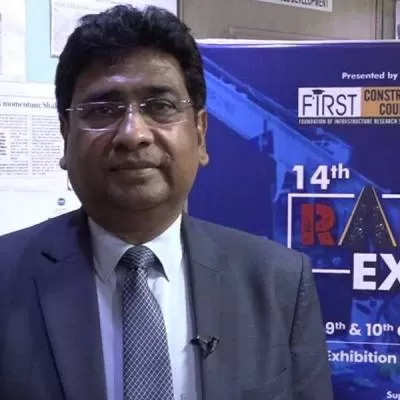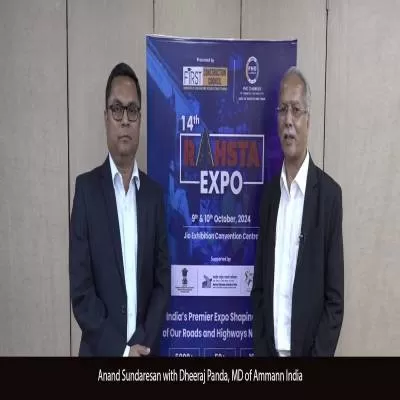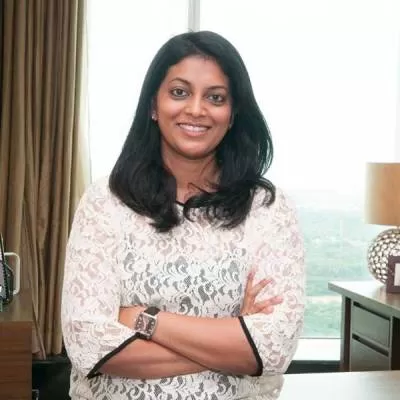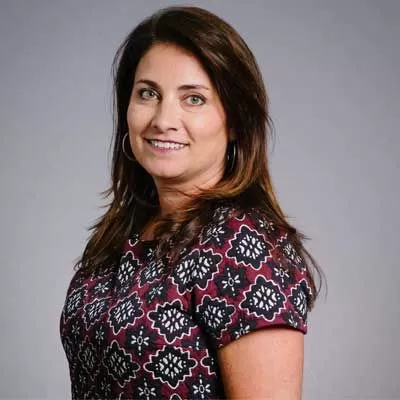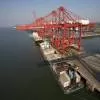- Home
- Technology
- Be enthusiastic and involved, and ready to take calculated risks
Be enthusiastic and involved, and ready to take calculated risks
Anita Arjundas, Director and CEO, Mahindra Lifespace Developers Ltd
CW presents the second of a series of interviews with women who have made their mark in the construction and real-estate sectors.
She’s leaving the next day for her first trip to the World Economic Forum at Davos. But Anita Arjundas has agreed to make time for us - her response to our request, instant and enthusiastic. As we gather in her spacious Mumbai office, dotted with discreetly placed certificates and accolades, a sliver of hesitancy, even shyness perhaps, creases her face when she spots our camera. But once the shoot is over, she is back in her element, the hesitancy replaced by eloquence, underlined by a quiet but unmistakable confidence in her work.
With reason. A master’s in Business Administration from the 1989 batch of BIM, she has over 21 years of corporate experience across the fast moving consumer goods, information technology and infrastructure and real-estate sectors. Arjundas, who now holds the coveted post of Director and CEO, Mahindra Lifespace Developers Ltd, shares her professional and personal journey with Group Managing Editor Falguni Padode...
An MBA with over 21 years of experience, you have made a place for yourself in the real estate and infrastructure industry, traditionally a male-dominated bastion. Tell us about your journey.
I entered the industry in 2002 after 13 years in the fast-moving consumer goods (FMCG) and IT industries. I joined the Mahindra Group at Mahindra World City as vice-president, marketing. The World City had just been inaugurated and the group was looking for someone to market the destination. Being primarily a B2B business, the context was quite different in terms of scale, project horizons and stakeholders involved from the prevalent notion about real estate. The job put me in regular contact with a wide array of stakeholders, from large Indian and international companies to trade bodies, governments, and specialist consultants. I learnt to appreciate and relate to the focus on procedural clarity, product utility and runtime service levels that enterprise customers bring to the table. The lessons learnt during this phase, coupled with my prior experience in the consumer goods industry, help me today in looking at real estate through a balanced perspective.
In terms of my career path, after four years as head of marketing at World City, I took over as the business head for Mahindra World City Developers Ltd in 2006 and moved to the rolls of the parent company Mahindra Lifespace Developers Ltd in 2007 with accountability for the Mahindra World City business in Chennai and Jaipur. In 2009, I took over as managing director and CEO of Mahindra Lifespace Developers Ltd, accountable for the real-estate business, including Lifespaces and World City, of the Mahindra Group. I was inducted into the group’s executive board in 2010.
What changes have you seen in this industry since you started out in terms of attitudes, accountability and transparency?
The trend of big investments in real estate is older than most people think. The ‘reality of realty’ has always made it seem like one of the safer places to put your money. Of course, the alternative options were quite limited or nascent not so long ago. What has happened recently is that investment now comes from a greater number and more diverse sources. This has led to the emergence of new companies and an exponential increase in supply. This growth has also been accompanied by a redefinition of quality and specifications. On the flipside, this change has made real estate a more heady space; you are more vulnerable to macroeconomic shocks and also run the risk of losing sight of the occupiers’ needs. We will see more cyclical changes but, overall, I feel this manifold increase in investment, coupled with the regulatory reform process gaining steam, can only be good news for the industry in the long term.
The question of accountability is at two levels for us developers. At the broader level, the question is of appropriateness of the product. Several markets have witnessed their cityscapes being polarised with islands of glitz and massive urban decay coexisting, underlining the need for responsive land-use and development control regulations guiding market forces. The second level of accountability is in developing your project responsibly in terms of relevant approvals and transparency of information sharing with customers and other stakeholders. As the industry matures and gets more institutionalised, levels of accountability and transparency are bound to go up.
What has your experience been in dealing with two different business segments?
It has been interesting. On one side, at Mahindra Lifespaces, we build homes for customers that are getting increasingly discerning and demanding. The opportunity to shape the urban landscape in a sustainable manner and build a geographically spread business across multiple product segments in a well-regulated fashion is exciting. At the other end, at Mahindra World City, the opportunity to build brand-new cities is heady. It calls for a long-term mindset where every decision you take today has long term and profound implications. At the same time, the demands to service best-in-class customers calls upon us to focus on attention to detail while planning forward on capacity and service efficiency. And there is a constantly evolving set of challenges through the development cycle of the city, whether it is land acquisition in the early days or driving trunk infrastructure like a railway station in the development phase to building schools and attracting retail as the city matures. The two businesses in that sense bring several learning moments and skill sets to the table for each other and help us leverage the same to the maximum benefit of both. The Mahindra brand raises customer expectations from us but at the same time the trust, credibility, and value systems of the Mahindra Group have made it easier to deal with a complex environment and operate with strong governance standards.
Tell us about the MOU with the Clinton Foundation.
Mahindra World City, Jaipur, has signed the MOU with the Clinton Foundation under the Clinton Climate Initiative (CCI)programme. The project is one of the 16 large-format infrastructure and real-estate projects across the world selected to partner with the programme to create benchmark practices in developing sustainable urban environments. Sustainable urbanisation is at the core of our business and living spaces and we take this very seriously. We were the first real-estate developers in the country to launch green homes and today six of our projects are either Platinum or Gold pre-certified by the Indian Green Building Council (IGBC). We also have a patent application under review by patent authorities for a unique composition of fly-ash bricks. At the World Cities, water conservation is a major agenda and we are now in the process of implementing a Green Supply Chain policy across both our businesses.
What are the challenges in this role, especially being a woman?
Being a rarity in this business has its pluses and minuses. Often, people automatically assume that you are not a senior resource or that you don’t necessarily understand a complex business. Opinions change as the interaction progresses but, yes, you sometimes start off having to establish your credentials and credibility. Other than this, I really do not see any special or specific challenges associated with being a woman. The complexities and challenges of this industry are gender agnostic in that sense.
But isn’t it difficult to be a woman at the top?
Honestly, in the past 21 years that I have been working, I have not really seen that as an issue. Maybe it is because I have been working for large, respected groups and the environment they provide doesn’t really differentiate between men and women. The only issue that you probably deal with is the initial impression, as I mentioned above. You walk into a meeting with a senior government official or a senior person in the industry and the tendency sometimes when you see a woman is to assume that she is not senior or a decision maker. If you walk in with a male colleague, people automatically assume the male colleague is senior - and when you hand over your card they are surprised. After the interaction, you do get the respect you deserve. I am not saying there is an issue but I think at the initial stage you do have to put in that extra effort to be noted, accounted or recognised.
What is your personal background?
I am single, not married. My parents are back home in Chennai, where I grew up and did most of my education. I have a sister who is a psychiatrist and lives in the UK. I went out of Chennai for a couple of years to Bengaluru and then back to Chennai for about six years with the group. I have been based in Mumbai for the past two years.
What about the work-life balance?
More of work and less of life actually! Jokes apart, I have not had to really deal with the pulls and pressures of managing two demanding environments. My family and friends have always been supportive of all my endeavours and reposed a lot of confidence in me and also gone that extra step to enable the home environment to run smoothly with very little effort from my side.
How does it feel to be reckoned among the leading women in this industry? At the CW Top Builder Awards 2010, you were the only woman (builder) awardee present...
I guess being the lone woman or one of few women is something many of us are used to, whether it was 20 years back in the FMCG industry or today in real estate and infrastructure. What is important is that your work speaks for itself and you contribute towards making a difference... to your employees, customers, investors, partners and the urban landscape.
What are your plans for the company?
A key objective is to grow our portfolio geographically, while maintaining our standards in terms of sustainable design and development. We are also looking to unlock economies of scale through this expansion, enabling us to deliver better value, on time, to our customers. Further, synergising with new partners is integrated into this part of our strategy. India’s urbanisation pose challenges at multiple levels. And we see new opportunities in each one of them. We are looking closely at the socioeconomic evolution of metropolises and other fast-growing cities to find how we can guide this growth through our offerings in residential real estate.
The two operational avatars of Mahindra World City have demonstrated the robustness of the concept, and we are working with other state governments to realise new economic nerve centres. These centres have the potential to catalyse development around the regions and create thousands of jobs, besides attracting thousand of crore of investment into the destination. There are two more World Cities on the drawing board in the South and West and we recently signed an MoU with the Gujarat Government to develop one in the Dholera Special Investment Region of the DMIC.
Personally, any academic plans?
No plans at this point in time of a formal, structured nature. The Group does have an annual, short-duration programme developed in association with Harvard Business School that serves as a medium for us to introspect, learn, and apply fresh thinking in strategising and innovating for our businesses.
In hindsight, if you had to re-chart your journey, would you do anything differently? Any tip for fellow women achievers?
The past two decades have offered me a rich diversity of experiences and challenges. I would not re-chart the journey any differently except maybe to have worked for a couple of years before joining B school in the start of my career.
I think it is very important to enjoy the work and bring a lot of passion and involvement to bear in what one does. It definitely reflects and shows in the quality of ideas generated and results achieved. And any person, man or woman, should infuse enthusiasm and involvement into their work to be truly successful. From a woman’s perspective, the other points I think should be reflected and worked upon is the ability to be less conservative and more ready to take calculated risks and to have confidence in the quality and soundness of one’s decision-making.
- Construction
- Update
- Portal
- Magazine
- February
- 2011
- World
- India
- Anita Arjundas
- Mahindra Lifespace Developers Ltd
- Real estate
- World Economic Forum
- Davos
- Mumbai
- BIM
- FMCG
- IT
- Mahindra World City
- Chennai
- Jaipur
- accountability
- investment
- transparency
- sustainable
- infrastructure
- Clinton Foundation
- CCI
- IGBC
- Green Supply Chain policy
- Chennai
- urbanisation
- investment
- Dholera Special Investment Region
- Gujarat
- DMIC
Anita Arjundas, Director and CEO, Mahindra Lifespace Developers Ltd CW presents the second of a series of interviews with women who have made their mark in the construction and real-estate sectors. She’s leaving the next day for her first trip to the World Economic Forum at Davos. But Anita Arjundas has agreed to make time for us - her response to our request, instant and enthusiastic. As we gather in her spacious Mumbai office, dotted with discreetly placed certificates and accolades, a sliver of hesitancy, even shyness perhaps, creases her face when she spots our camera. But once the shoot is over, she is back in her element, the hesitancy replaced by eloquence, underlined by a quiet but unmistakable confidence in her work. With reason. A master’s in Business Administration from the 1989 batch of BIM, she has over 21 years of corporate experience across the fast moving consumer goods, information technology and infrastructure and real-estate sectors. Arjundas, who now holds the coveted post of Director and CEO, Mahindra Lifespace Developers Ltd, shares her professional and personal journey with Group Managing Editor Falguni Padode... An MBA with over 21 years of experience, you have made a place for yourself in the real estate and infrastructure industry, traditionally a male-dominated bastion. Tell us about your journey.I entered the industry in 2002 after 13 years in the fast-moving consumer goods (FMCG) and IT industries. I joined the Mahindra Group at Mahindra World City as vice-president, marketing. The World City had just been inaugurated and the group was looking for someone to market the destination. Being primarily a B2B business, the context was quite different in terms of scale, project horizons and stakeholders involved from the prevalent notion about real estate. The job put me in regular contact with a wide array of stakeholders, from large Indian and international companies to trade bodies, governments, and specialist consultants. I learnt to appreciate and relate to the focus on procedural clarity, product utility and runtime service levels that enterprise customers bring to the table. The lessons learnt during this phase, coupled with my prior experience in the consumer goods industry, help me today in looking at real estate through a balanced perspective. In terms of my career path, after four years as head of marketing at World City, I took over as the business head for Mahindra World City Developers Ltd in 2006 and moved to the rolls of the parent company Mahindra Lifespace Developers Ltd in 2007 with accountability for the Mahindra World City business in Chennai and Jaipur. In 2009, I took over as managing director and CEO of Mahindra Lifespace Developers Ltd, accountable for the real-estate business, including Lifespaces and World City, of the Mahindra Group. I was inducted into the group’s executive board in 2010. What changes have you seen in this industry since you started out in terms of attitudes, accountability and transparency?The trend of big investments in real estate is older than most people think. The ‘reality of realty’ has always made it seem like one of the safer places to put your money. Of course, the alternative options were quite limited or nascent not so long ago. What has happened recently is that investment now comes from a greater number and more diverse sources. This has led to the emergence of new companies and an exponential increase in supply. This growth has also been accompanied by a redefinition of quality and specifications. On the flipside, this change has made real estate a more heady space; you are more vulnerable to macroeconomic shocks and also run the risk of losing sight of the occupiers’ needs. We will see more cyclical changes but, overall, I feel this manifold increase in investment, coupled with the regulatory reform process gaining steam, can only be good news for the industry in the long term. The question of accountability is at two levels for us developers. At the broader level, the question is of appropriateness of the product. Several markets have witnessed their cityscapes being polarised with islands of glitz and massive urban decay coexisting, underlining the need for responsive land-use and development control regulations guiding market forces. The second level of accountability is in developing your project responsibly in terms of relevant approvals and transparency of information sharing with customers and other stakeholders. As the industry matures and gets more institutionalised, levels of accountability and transparency are bound to go up. What has your experience been in dealing with two different business segments?It has been interesting. On one side, at Mahindra Lifespaces, we build homes for customers that are getting increasingly discerning and demanding. The opportunity to shape the urban landscape in a sustainable manner and build a geographically spread business across multiple product segments in a well-regulated fashion is exciting. At the other end, at Mahindra World City, the opportunity to build brand-new cities is heady. It calls for a long-term mindset where every decision you take today has long term and profound implications. At the same time, the demands to service best-in-class customers calls upon us to focus on attention to detail while planning forward on capacity and service efficiency. And there is a constantly evolving set of challenges through the development cycle of the city, whether it is land acquisition in the early days or driving trunk infrastructure like a railway station in the development phase to building schools and attracting retail as the city matures. The two businesses in that sense bring several learning moments and skill sets to the table for each other and help us leverage the same to the maximum benefit of both. The Mahindra brand raises customer expectations from us but at the same time the trust, credibility, and value systems of the Mahindra Group have made it easier to deal with a complex environment and operate with strong governance standards. Tell us about the MOU with the Clinton Foundation.Mahindra World City, Jaipur, has signed the MOU with the Clinton Foundation under the Clinton Climate Initiative (CCI)programme. The project is one of the 16 large-format infrastructure and real-estate projects across the world selected to partner with the programme to create benchmark practices in developing sustainable urban environments. Sustainable urbanisation is at the core of our business and living spaces and we take this very seriously. We were the first real-estate developers in the country to launch green homes and today six of our projects are either Platinum or Gold pre-certified by the Indian Green Building Council (IGBC). We also have a patent application under review by patent authorities for a unique composition of fly-ash bricks. At the World Cities, water conservation is a major agenda and we are now in the process of implementing a Green Supply Chain policy across both our businesses. What are the challenges in this role, especially being a woman?Being a rarity in this business has its pluses and minuses. Often, people automatically assume that you are not a senior resource or that you don’t necessarily understand a complex business. Opinions change as the interaction progresses but, yes, you sometimes start off having to establish your credentials and credibility. Other than this, I really do not see any special or specific challenges associated with being a woman. The complexities and challenges of this industry are gender agnostic in that sense. But isn’t it difficult to be a woman at the top? Honestly, in the past 21 years that I have been working, I have not really seen that as an issue. Maybe it is because I have been working for large, respected groups and the environment they provide doesn’t really differentiate between men and women. The only issue that you probably deal with is the initial impression, as I mentioned above. You walk into a meeting with a senior government official or a senior person in the industry and the tendency sometimes when you see a woman is to assume that she is not senior or a decision maker. If you walk in with a male colleague, people automatically assume the male colleague is senior - and when you hand over your card they are surprised. After the interaction, you do get the respect you deserve. I am not saying there is an issue but I think at the initial stage you do have to put in that extra effort to be noted, accounted or recognised. What is your personal background? I am single, not married. My parents are back home in Chennai, where I grew up and did most of my education. I have a sister who is a psychiatrist and lives in the UK. I went out of Chennai for a couple of years to Bengaluru and then back to Chennai for about six years with the group. I have been based in Mumbai for the past two years. What about the work-life balance?More of work and less of life actually! Jokes apart, I have not had to really deal with the pulls and pressures of managing two demanding environments. My family and friends have always been supportive of all my endeavours and reposed a lot of confidence in me and also gone that extra step to enable the home environment to run smoothly with very little effort from my side. How does it feel to be reckoned among the leading women in this industry? At the CW Top Builder Awards 2010, you were the only woman (builder) awardee present...I guess being the lone woman or one of few women is something many of us are used to, whether it was 20 years back in the FMCG industry or today in real estate and infrastructure. What is important is that your work speaks for itself and you contribute towards making a difference... to your employees, customers, investors, partners and the urban landscape. What are your plans for the company?A key objective is to grow our portfolio geographically, while maintaining our standards in terms of sustainable design and development. We are also looking to unlock economies of scale through this expansion, enabling us to deliver better value, on time, to our customers. Further, synergising with new partners is integrated into this part of our strategy. India’s urbanisation pose challenges at multiple levels. And we see new opportunities in each one of them. We are looking closely at the socioeconomic evolution of metropolises and other fast-growing cities to find how we can guide this growth through our offerings in residential real estate. The two operational avatars of Mahindra World City have demonstrated the robustness of the concept, and we are working with other state governments to realise new economic nerve centres. These centres have the potential to catalyse development around the regions and create thousands of jobs, besides attracting thousand of crore of investment into the destination. There are two more World Cities on the drawing board in the South and West and we recently signed an MoU with the Gujarat Government to develop one in the Dholera Special Investment Region of the DMIC. Personally, any academic plans?No plans at this point in time of a formal, structured nature. The Group does have an annual, short-duration programme developed in association with Harvard Business School that serves as a medium for us to introspect, learn, and apply fresh thinking in strategising and innovating for our businesses. In hindsight, if you had to re-chart your journey, would you do anything differently? Any tip for fellow women achievers?The past two decades have offered me a rich diversity of experiences and challenges. I would not re-chart the journey any differently except maybe to have worked for a couple of years before joining B school in the start of my career. I think it is very important to enjoy the work and bring a lot of passion and involvement to bear in what one does. It definitely reflects and shows in the quality of ideas generated and results achieved. And any person, man or woman, should infuse enthusiasm and involvement into their work to be truly successful. From a woman’s perspective, the other points I think should be reflected and worked upon is the ability to be less conservative and more ready to take calculated risks and to have confidence in the quality and soundness of one’s decision-making.


